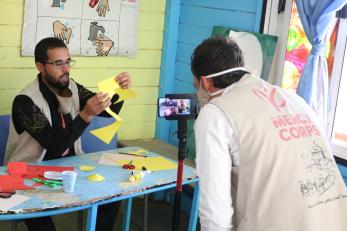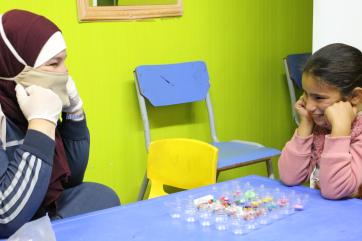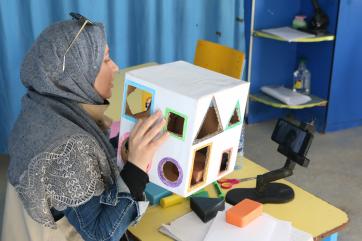Maintaining support for children inside Syrian refugee camps

Like many countries around the world, Jordan closed schools in March 2020 to mitigate the spread of COVID-‑19. This created particular challenges for children with disabilities, who depend on regular therapy sessions to meet their learning goals. In response, and adapting quickly to the challenges posed by closures, Mercy Corps adjusted our camp-based activities to ensure the uninterrupted provision of assistance to the most vulnerable students.
Beginning in March, Mercy Corps started disseminating online education sessions through shadow teachers, often referred to as learning support assistants. Shadow teachers shared links for relevant therapeutic exercises that parents could use at home and created and shared videos highlighting educational tools and craft ideas that parents could utilize easily.
Recently, Mercy Corps and UNICEF - with approval from camp authorities - also introduced a new mechanism to ensure the participants receive the assistance they need with face-to-face sessions for children with disabilities now hosted in UNICEF-supported Makani Centers. In the centers, Mercy Corps ensures that all COVID‑19 safety measures are followed, including deep cleaning procedures; safety precautions such as handwashing; the inclusion of no more than one child per session; regular PCR testing for volunteers; and contact tracking of children and volunteers with potential exposure. As needed, children are also able to easily shift their sessions online.


To date, 854 students inside the Syrian refugee camps have benefited from therapy sessions hosted at the Makani centers.
Mercy Corps Jordan’s UNICEF-funded inclusive education program aims to address the needs of Syrian refugee and Jordanian children with disabilities and provide them with equal access to quality public education. The program targets children ages 5-18 with mild to moderate disabilities and equips schools with support services and staff to enhance student learning and development outcomes.
The inclusive education program operates in refugee camps (Zaatari and Azraq Camps) along with urban communities all around Jordan.
In camps specifically, the project enables children with disabilities to access quality education, rehabilitative sessions and transportation support. Shadow teachers also support children with disabilities inside the regular classroom sessions, using scientifically proven educational strategies and techniques that improve their integration into the classroom setting.
In Azraq and Zaatari camps, the inclusive education program also supports ‘adaptation workshops’, staffed by Syrian volunteers who perform basic repairs to equipment like wheelchairs, eyeglasses and hearing aids, assist with the adaptation of classroom equipment such as desks and chairs for children with special needs, and take on special projects such as the design and manufacturing of bicycle trolleys to provide safe transportation and access to services for students with disabilities within the camps.